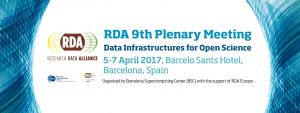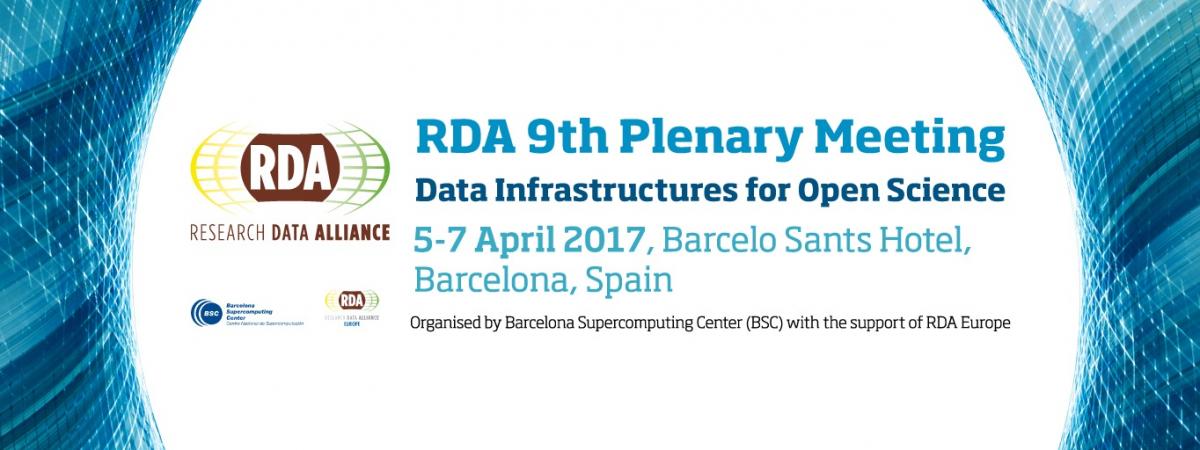
How to improve the discoverability and the interoperability of multi-disciplinary scientific semantic resources?
|
As co-located event with RDA 9th Plenary in Barcelona, EUDAT hosted a Semantic Working Group Workshop on 3-4 April 2017.
The workshop was dedicated to discuss on how to enhance the discoverability and interoperability of the existing domain specific semantic resources i.e. ontologies/vocabularies and the existing repositories as well as the various type of scientific semantic resources (e.g. SPARQL endpoints, Linked Data endpoint, FAIR data points).
|
The aim was to improve the reuse of these resources for data annotations and interlinking with external data resources within the EUDAT infrastructure. It served as meeting point between maintainers of domain semantic resources (e.g. taxonomy/ontology repositories) and EUDAT in order to outline recommendations for the publication and access of existing contents as well as for the underlying technologies. Research infrastructures from different domains, representing potential users, were part of the meeting in order to provide input on their individual and domain specific uses of semantic technologies, both with respect to the nature of their data as well as their requirements for potential semantic services within the EUDAT infrastructure. By analysing and discussing the RDA recommendations from the Vocabulary service IG, this workshop contributed to the extension of the initial work and the design of the EUDAT infrastructure.
The workshop was organised along the following thematic issues:
- Introduction and setting the scene
- Presentation of semantic portals and ontology registries (e.g. BioPortal, AgroPortal, EBI OLS, Linked Open Vocabulary, etc.)
- Presentation of semantic technologies and workflows for publishing and use of semantic resources by the research communities and infrastructures (e.g. CLARIN, LTER, etc.)
- Presentation of the progress made by the RDA vocabulary service Interest Group
- Recommendations for a common ontology lookup service (interactive sessions)
- Recommendations for making semantic resources discoverable and interoperable in alignment with RDA existing recommendations.
Who was the workshop for?
The workshop aimed at Representatives from Research Infrastructures (e.g. LTER, CLARIN, etc.), Representatives from Semantic registries and Semantic experts
Registration to the event is now closed.
| Monday 3 April 2017 | |
| 12:00 - 13:00 |
Welcome and lunch
|
| 13:00 - 15:30 | Semantic services in EUDAT: the need for semantic resource discoverability and interoperability – Yann Le Franc (20’) |
| State-of-the-art analysis of the existing semantic resources - Doron Goldfarb (20’) | |
|
Existing of semantic resources (100’):
Format= 15’ Talk + 5’ Q&A
• Bioportal (20’) - John Graybeal
• EBI OLS (20’) - Simon Jupp
• LOV/LOD (20’) - Maria Poveda
• Biosharing (20’) - Susanna-Assunta Sansone
• Agroportal (20’) - Anne Toulet
|
|
| Discussion 10’ | |
| 15:30 - 16:00 | Coffee break |
| 16:00- 18:00 |
Research Infrastructure and semantics (90’):
Format= 10’ talk + 5’ Q&A
• Europeana (15’) - Nuno Freire
• UPorto (15’) - Joao Rocha Da Silva
• Fair Data (15’) - Mark Thompson
• DataOne (15’) - Mark Shildhauer
• CLARIN (15’) - Daan Broeder
• ENVRI+ (15’) - Barbara Magagna
|
| Update on RDA vocabulary service (20’) - Simon Cox | |
| General discussion - 10’ | |
| 20:30 | Social dinner |
| Tuesday 4 April 2017 | |
| Topic of the day |
How to build a multi-disciplinary semantic resource look up service?
|
| 9:00 - 10:30 |
How to harmonize ontology metadata description?
Introductory talk by John Graybeal: existing ontology metadata recommendations (20’)
|
| 10:30-11:00 | Coffee break |
| 11:00-12:30 | How to harmonize ontology metadata description? |
| 12:30-13:30 | Lunch |
| 13:30-15:30 | How to make semantic endpoints interoperable and discoverable by machines? Introductory talk by Mark Wilkinson: smart APIs (20’) |
| 15:30-16:00 | Coffee break |
| 16:00-17:30 | How to make semantic endpoints interoperable and discoverable by machines? |
| 17:30 - 18:00 |
Concluding remarks and next steps (white paper, review paper, position paper, recommendations, ...)
Next WG topics (ontology building good practices, evaluation usage of LD in scientific communities, ...)
|

